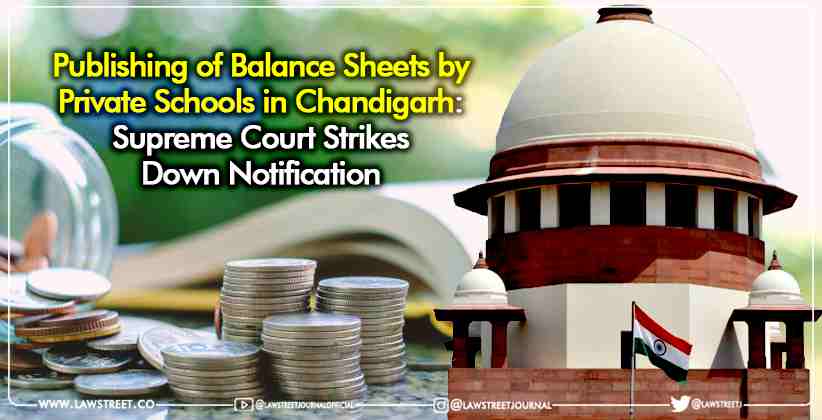The Apex Court has ruled that a clause in an April 2018 notification issued by the Ministry of Home Affairs requiring private unaided educational institutions in Chandigarh to publish their balance sheets/income and expenditure accounts on their websites is unconstitutional.
While considering a special leave petition challenging the Punjab and Haryana High Court's judgement of May 28, 2021, upholding an April 2018 notification issued by the authorities by exercising powers under Section 87 of the Punjab Reorganization Act, 1966, a portion of the notification was struck down.
The writ petitions were rejected by the High Court, which ruled that the proper authority had the competence to issue such a government order or notification.
'Clause a' of the notification said that private educational institutions in Chandigarh were required by "clause a" to inter alia post their balance sheets/income and expenditure accounts on their websites (clause a) and were not required to demand any fees from parents.
In addition, the petitioners argued that the impugned government order/notification violated the Punjab (Regulations of Fees of Unaided Educational Institutions) Act, 2016, which governs unaided educational institutions in the Union Territory.
The panel resorted to the decision in Lachmi Narain vs. Union of India, 1976 (2) SCC 953, to deliberate on the objection to the notification's "clause a."
According to v Union of India, a three-judge bench had dealt with a provision identical to Section 87 of the 1966 Act and had noted that,
"Such a wide construction must be eschewed lest the very validity of the section becomes vulnerable on account of the vice of excessive delegation. Moreover, such a construction would be repugnant to the context and content of the section, read as a whole, and the statutory limits and conditions attaching to the exercise of the power. We must, therefore, confine the scope of the words "restrictions and modifications" to alterations of such a character which keep the inbuilt policy, essence, and substance of the enactment sought to be extended, intact, and introduce only such peripheral or insubstantial changes which are appropriate and necessary to adapt and adjust it to the local conditions of the Union Territory. "
As stated in the Supreme Court's decision:
"Reverting to the stipulation specified in clause (a), we have no manner of doubt that the same cannot be considered as a peripheral and insubstantial change. For, it is a substantive matter. We say so because the Principal Act (2016 Act), which is extended in terms of the impugned Government Order/Notification, makes no provision regarding disclosure of income, expenditure, account and balance sheet on the websites of the unaided schools, including as applicable in the State of Punjab. It would be a different matter if the Parliament or the State Legislature, as the case may be, were to incorporate such a condition in an enactment such as the 2016 Act. Had it been so incorporated, it would then be open to the unaided institutions to question the validity of such a provision, which could be tested by the Constitutional Court on the basis of the doctrine of fairness, arbitrariness and other grounds available under Part III of the Constitution of India or otherwise."
The Court noted that the imposed alteration was not incidental or insignificant and stated,
"Suffice it to observe that the change introduced vide the impugned government order/notification in terms of clause (a) in the third proviso inserted by way of paragraph 6 thereof, is not a peripheral or insubstantial change. Hence, it is clearly outside the scope of the authority bestowed on the competent authority in terms of Section 87 of the 1966 Act. That stipulation, therefore, needs to be struck down as being ultra vires."
Parents in Chandigarh's private unaided educational institutions are not compelled to pay any fees, the Court said:
"In that, this stipulation merely prohibits the unaided institutions from charging any kind of cost from the parents. In our opinion, this is consistent with the legislative intent and mandate of the 2016 Act. In fact, it restates the inbuilt policy, essence, and substance of the 2016 Act. Thus, it is in no way a substantial change, as in the case of clause (a), referred to above. Be it noted that as per clause (c) of paragraph 6 of the impugned government order/notificationthe validity of which has not been challengedthe unaided institutions are obliged to disclose the complete fee structure at the beginning of the academic year. The obligation of the unaided institutions in terms of clause (b) of the same paragraph is in reference to the disclosure of fee structure as per clause (c). In other words, unaided institutions can charge only the disclosed fee structure amount from its students and no further. This provision, therefore, is appropriate and necessary for the better administration of the unaided institutions to which the 2016 Act gets extended in terms of the impugned Government Order/Notification."
Regarding the question of increasing the sentence, the court ruled:
"Again, this is not a peripheral or insubstantial alteration or modification of Section 14. Inasmuch as what should be the quantum of penalty amount or punishment is a legislative policy, it must be left to the concerned legislature. It cannot be provided by way of an executive order, including in the exercise of powers under Section 87 of the 1966 Actbeing a substantial change to the regime predicated in Section 14 of the 2016 Act. Accordingly, paragraph 8 of the impugned government order/notification also cannot stand the test of judicial scrutiny. Hence, the same needs to be struck down as being unconstitutional and ultra vires. "






